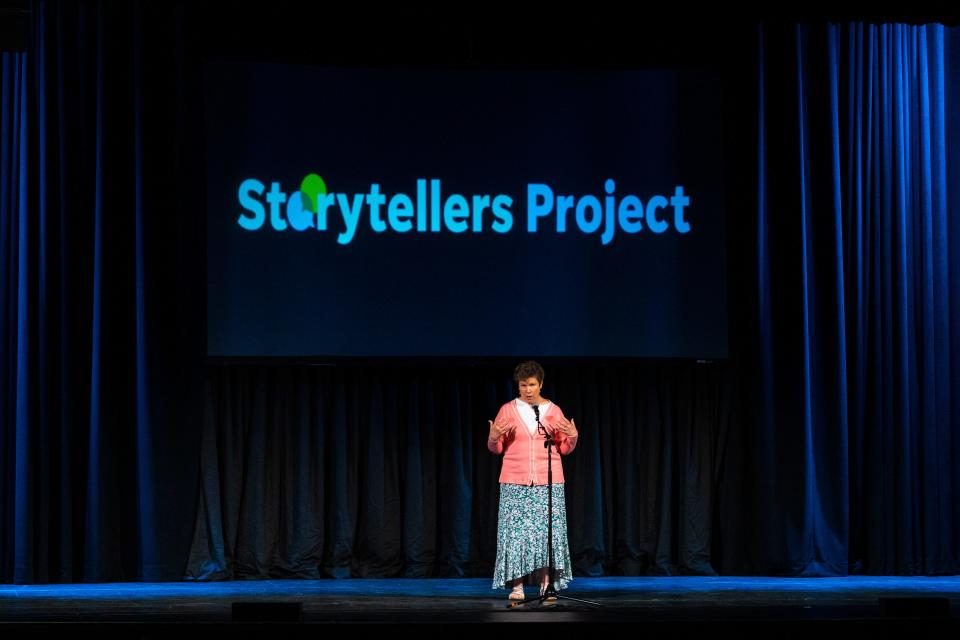A solo backpacking journey in communist China leads an Iowan on a unique adventure
Editor's note: Susan Sims first told this story on stage at the Des Moines Storytellers Project's "Travel." The Des Moines Storytellers Project is a series of storytelling events in which community members work with Register journalists to tell true, first-person stories live on stage. An edited version appears below.
So there I was, in Chengdu, deep in the west of communist China. The artist in front of me showed me a beautiful and massive hand-painted scroll of the most exquisite landscape. He wanted $100 for it. I had about $150 on my person in a country with no such thing as an ATM. But my friend told me that all agreed he was the best artist in the city. And when was I going to get another chance like this? I bartered for it and made the purchase at $50, a still princely sum at that time and place.
It was 1986 and I was 22.
I had been studying land reform in Taiwan and was to return to the U.S. for graduate school, and I decided I should see China. It was just opening up to tourists. I couldn’t afford a real tour and didn’t want to go on one anyway. I wanted to see the real thing, even if I had to go alone.

And so I did what I would never have allowed my children to do. In an era without cell phones, at a time when no one could know where I was at any given moment, I stowed my belongings in a locker at the Salvation Army hotel in Hong Kong and bought a bootleg visa at a backpack shop.
Yes, I was naïve. And poor. I could only spare $200 for my two-week journey.
I outfitted my new and comically small backpack with a change of clothes, a roll of toilet paper, a bag of M&Ms, a jar of peanut butter, a pack of disposable chopsticks and one disposable water bottle. One. I had two rolls of film but only one set of batteries for my camera and one for my Panasonic version of a Walkman. I had but one cassette: Dire Straits “Brothers in Arms.” Both the M&M’s and the music were reserved for, well, the most dire of straits.
Neither lasted long because I was so unprepared that I am still astonished I even survived. I had even forgotten to get malaria pills.
My vague travel plan fell apart after the second day, when I realized I could not always pick where I would go next if I wanted to go anywhere at all in a country without a real transportation network.
I had already spent a day in Canton (now Guangzhou), where I bumped into a black marketeer who could get me local Chinese currency instead of what tourists were issued by the government. That money was only good in shops that carried things the government wanted tourists to see. I wanted to see the real shops, even though they didn’t sell much at all. The dodgy person I met told me where the “drop point” was (under a bridge) and so I met him there to get my cash.
Soon, I had rented a Flying Rabbit bicycle to get around better and ended up in three minor collisions. I also broke two laws and had my bike impounded. I was getting pretty good at petty crime. Or maybe I just couldn’t read Chinese.
I booked passage on a slow-moving boat with no real deck or chairs or anything remotely comfortable for an 18-hour ride inland. I soon had to ask myself what I was thinking when I did this. Maybe it was the cold rice, the cockroaches, the total lack of privacy or dignity of sitting or lying on a mat shoulder to shoulder with strangers, but it was probably the spider hotel that doubled as the open-air latrine on the back of the boat.
As multiple spiders descended on their lines to inspect me, I tried to not look up. I hate spiders. But there they were, like Charlotte descending to greet Wilbur — only lots of Charlottes and I was not pleased to make their acquaintance.
But I was disavowed of my regret and rewarded for my troubles when I eventually made it to the then-tiny hamlet of Yangshou in the midst of the most beautiful limestone mountains I could imagine. Suddenly it was all worth it.

Other backpackers, mostly from Europe, were abundant, so I found company for lunch. The meal was the best beef and broccoli stir fry I have ever eaten. It was wonderful. As I was leaving, I took a peek into the kitchen and thought, "I’m gonna die."
I thought the same thing at my little hotel — a converted house — as I began to settle in for the night under an expansive pink mosquito net, when the walls began to move. I tucked that net under me and didn’t sleep much until early light when the spiders began to retreat.
I rented another bike to tour around those captivating mountains. It was a different world all together. And I didn’t break any laws that I know of. I did disappoint two young farmers I met who noticed my camera and signaled I should take their picture — then waited expectantly for the photo to appear. I didn’t have a Polaroid and had no idea how they knew about them. They lived in a mud house with no windows or electricity. My Chinese was very limited, but I made my apologies and kept cycling.
To my surprise, the only place I could afford to reach next was Chengdu. I had barely heard of it and didn’t intend to go there. My mode of travel was an airplane that flew at about 5,000 feet. It rattled like it was going to fall apart at any moment, and it didn’t have fixed seats. We had folding chairs that clipped into the floor. But the flight attendants gave us a snack box to take our minds off of crashing. It worked. The view was great and we landed safely.
I had struck up a friendship with a young Chinese swimmer on that flight, and we spent the next day together. That’s when I saw my first panda — plus homes carved into mountains like caves with wooden entrances. It’s also where I ate Sichuan food for the first time, and it was so spicy I wanted to never eat it again.
And that’s the day my new friend and I encountered the artist with the scroll. Having purchased this great prize, I mused in my journal I might run out of money, but it was worth the risk. I took great care of that scroll that stood 4 feet high. I carried it everywhere with some string we attached to the case. I even slept with the scroll when I was in communal settings — which was often.
The ancient capital, Xi’an, beckoned next, mostly because it was the only city in a northerly direction I could get to from Chengdu. What a beautiful city! It was hardly damaged in the Revolution.
Only about a decade before, the terracotta warriors had been unearthed, and I was able to see some early excavation efforts. Everything else I saw was while running around all day to find a hotel that would let me in.
Backpackers were routinely turned away from hotels where tour groups stayed. But the Double Dragon hotel proved the perfect spot for me anyway. Cost: $3. It had been open just a few days, and I had the honor of being the first American to stay there. It was really only meant for Chinese travelers. The manager was so helpful and made sure I had a mosquito net and clean bed.
The next day, he even took me to the train station in his brand new van, as if I were a celebrity visitor.

That level of personal kindness was indicative of regular people I met, a stark contrast to the attitude and treatment by government functionaries.
Case in point: my next stop was Beijing. Cash was low and I needed to take a train. The ticket master did not want to sell an American backpacker any ticket at all. She said the train was full. Well, third class is never really full, and I knew that. Though I fully understood "No ticket" and her attempts to get me to leave the counter, I knew this was my only chance to get to Beijing. So, I pulled my "dumb American" act, smiled and nodded, "yes, that’s right, Beijing, third class, thank you" over and over until she gave up in exasperation and sold me the ticket.
I was soon to regret my lack of cash for a better ticket. Third class on a Chinese train in the 1980s put me in the company of heavily smoking and yelling men lying on the bunks stacked three-high, six people to a cabin that had only room to get off the bunk. I spent most of my time walking the narrow hall near the open windows so I could breathe.
Finally, finally I found myself in the city I wanted to reach: Beijing, the capital.
It was vast — and dusty, full of bikes and buses. Lodging for backpackers: a hostel in a seedy part of town where everyone slept pretty much in the same room on cots. No nets, because malaria wasn’t an issue that far north. Bed bugs, on the other hand, were plentiful.
I might have preferred Charlotte back on the boat to these nighttime visitors. I awoke my first morning in town with bites from head to toe. I learned the next night to line my cot with newspaper and sleep on top of everything. Yet, just like the challenge of riding on the boat, this headache was totally worth it. For Beijing was the gateway to the Great Wall, something that was so mystical and curious to me.
I connected with some Swedish girls heading to the wall and we had a marvelous time climbing its steeper portions as it wove like a giant serpent along the mountain ridges.
Then it was on to the Forbidden City, with its giant Mao portrait festooned to the entrance, and Tiananmen Square. I took some photos of the soldiers in the square when they weren’t looking. It would be only three years later that I would see that same space on TV while a lone man faced down a tank.
My new Swedish friends went their way as I wandered through various communist museums, and then I got lost trying to get back to the hostel. I nearly passed out from dehydration.
But a larger problem loomed over me. I was completely out of cash. There was no way to buy any more tickets, not even third class, and I was due back in Hong Kong to catch a flight to South Korea. I was also 2,000 kilometers away from Hong Kong. Fortunately for me, Visa had very recently established a connection with the Bank of China. It took some hunting, but I found the right office and was able to get enough cash to buy a first-class sleeper ticket on a 36-hour express train to the border.
What luxury that was. No Charlottes to greet me in the loo, and doors on the cabins! Yes I shared space with a few strangers, but I had been doing that for days. When we arrived in Shenzhen, I walked with great relief over the border into Hong Kong, still then a part of the British Empire. I retrieved my belongings from the locker and soon flew to South Korea to meet a friend before my final flight home.
Still dangerously low on cash, I couldn’t afford a hotel. But my friend’s professor and wife were kind enough to offer me a place to stay for the night. They even took me shopping for new clothes. I didn’t realize I looked that ragtag.
In our conversations about my journey, I talked about my prized art scroll that I had carried and coddled for so many days. When I showed it to the professor, he recognized the scenery with great emotion because it reminded him of his ancestral homeland. And he was barred from traveling to China because of his political activities.
I suddenly knew I had a decision to make, and I gave him the scroll to give him hope he might one day see his homeland again. I don’t know if he ever did. And it kind of broke my heart to part with that lovely artwork that I planned to hang on some future wall in some future home. But it was the right thing to do.
And so I flew home with a few trinkets I had picked up along the way, hopefully some photos, and memories of my grand adventure. Would I do it again? Well, not like I did!
It was rather reckless and irresponsible. And anyway, adventures are not repeatable. That is what makes them singular treasures to be shared on occasion with new friends.
More: Des Moines Storytellers Project: How to tell a story and buy tickets to the next show
ABOUT THE STORYTELLER: Susan Sims is a community volunteer and a church communication director. She and her husband, Brian, came to Iowa in 1993 for medical school and decided to stay. They raised their five kids in Cedar Falls after seven years in Des Moines. Family travel, volunteering and reading are among Susan’s favorite activities.

Become a teller
The Des Moines Storytellers Project strongly believes that everyone HAS a story and everyone CAN tell it. None of the storytellers who take our stage are professionals. They are your neighbors, friends or co-workers, and they are coached to tell by Register journalists.
Want to tell your story at one of our upcoming Storytellers Project events? Read our guidelines and submit a story at DesMoinesRegister.com/Tell.
Contact storytelling@dmreg.com for more information.
Hear past storytellers
WATCH: Mediacom rebroadcasts stories from the most recent show on MC22 periodically; check local listings for times. A replay is also available at YouTube.com/DMRegister.
LISTEN: Check out the Des Moines Storytellers Project podcast, which is available on your favorite podcasting platforms.
Your subscription makes work like this possible. Subscribe today at DesMoinesRegister.com/Deal.
This article originally appeared on Des Moines Register: Backpacking alone in communist China took this Iowan on 1986 adventure

